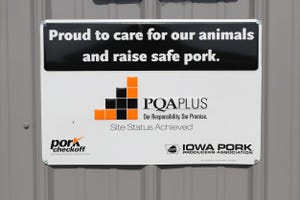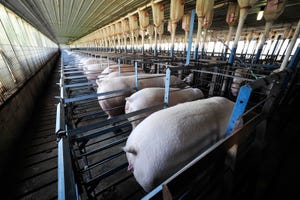July 7, 2016

“When did we lose control,” I asked.
“We never really had control,” was the reply.
That exchange occurred many years ago with my editor at the publication I previously worked for as we were informed of demands placed on the magazine’s editorial product by an advertiser or an advertising agency.
That same conversation can be replayed across U.S. agriculture as it pertains to the demands being placed on our standard operating procedures by outsiders, mainly anti-progress advocates who claim to be speaking for the consuming public.
Just this week, the highest court in Massachusetts ruled that voters from the Bay State will likely be able to weigh in on a ballot question this fall that would ban the sale of meat or eggs from confined animals in Massachusetts and ban the confinement of certain animals at Massachusetts farms.
According to MassLive.com, plaintiffs argued that “the ballot question was unconstitutional because it included multiple unrelated subjects, since it would both ban the confinement of animals on Massachusetts farms and ban the sale of meat or eggs from animals that were confined elsewhere in the country. The question also concerns three different animals: egg-laying hens, calves raised for veal and breeding pigs.”
As no surprise, MassLive.com says the ballot question is the work of the Humane Society of the United States.
One of the plaintiffs wishing to keep this question out of voters’ hands in November is an anti-poverty activist, and she argues that though the question may appear to be an animal welfare issue it actually becomes a food-affordability issue. “Taking away affordable choices for those of us who can least afford any choices right now is the wrong way for Massachusetts voters to go,” the plaintiff-activist says in the MassLive.com article.
The online article states that there are 10 states with measures in place to ban the confinement of calves raised for veal, breeding pigs and egg-laying hens in small cages.
How big of an issue is this in Massachusetts? Well, according to the article, only one farm in Massachusetts currently confines hens, and no farms confine calves or pigs. On the surface this appears to be a lot to do about nothing. But, as the poverty activist points out the bigger impact would be the provision banning the sale of food from confined animals. Opponents of the initiative say that would drive up the price of meat and eggs.
As past measures have shown, it goes even beyond that. All of these measures are really about putting an end to animal agriculture.
Though this Massachusetts measure may not immediately nor directly impact a lot of growers, the tentacles of any HSUS measure will reach you if you have hogs in the Midwest or beyond.
Same goes for the USDA’s proposed animal welfare standards for the National Organic Program. You say, “I don’t raise organic livestock, so this doesn’t matter to me.”
Think again.
No matter the name of any measure or proposal, if “animal welfare” is in the title, you had better bet that the implications will sooner or later come around to govern your farm’s operation.
That is why the National Pork Producers Council is adamant in encouraging all pork producers to weigh in on the proposed standards. The NPPC has created a place online where producers can have their say. On this site, the NPPC explains the proposed standards “that, if enacted, would be the first time such standards are codified in federal law and would present serious challenges to livestock producers.
“There are a number of problems with the proposed new standards, including: animal production practices have nothing to do with the basic concept of ‘organic’; the standards add complexity to the organic certification process, creating significant barriers to existing and new organic producers; and they could jeopardize animal and public health.”
The NPPC further explains specific points on the new standards, and then provides producers a form to submit comments after first registering their pertinent information. July 13 is the deadline to comment.
Speak up now, or you may lose more of the control that we never really had.
You May Also Like



